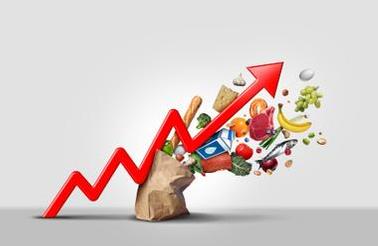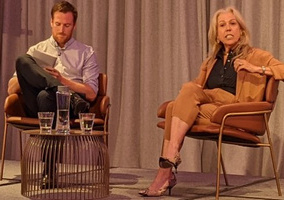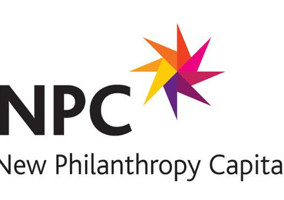Charity sector bodies have warned that some voluntary organisations are likely to close in the coming months as inflation increased to a 40-year high.
Organisations are being hit by higher costs, lower donations and increased demand, they warned, with pressures set to intensify further as inflation is expected to rise even higher.
The consumer price index rose 10.1% annually in July, according to estimates published by the Office for National Statistics (ONS) today.
This comes after data released on Tuesday showed British workers had suffered a record real-term wage slump.
Charity sector bodies urged the government to do more to support the both sector and vulnerable people who voluntary organisations support.
CAF: 'Sadly there are likely to be some charities unable to survive this year'
Alison Taylor, chief executive of CAF Bank and charity services, Charities Aid Foundation, warned prices are rising faster than they have done for 40 years, but inflation is not set to peak until autumn.
“As rising living costs start to hit communities and families, many more people are relying on charities – from food banks, mental health and disability support, to organisations offering financial guidance,” she said.
“However, after two years of stretched resources during the pandemic, charities are also having to find the funds to pay higher costs. More than four in five (82%) charity leaders are concerned about how they are going to pay for their own utility bills with rent, energy and fuel increasing. Wages are also a cause for concern. Care homes we have spoken to are struggling to retain employees; the majority are on minimum wage, and some are turning to commercial jobs in order to pay their bills.
“Tightening household budgets are already having an impact on donations and rapid inflation means that grants and donations are not going as far as they used to in real terms. In the current economic climate, sadly there are likely to be some charities unable to survive this year.”
Taylor said a third of charities were worried about their survival and called on the government to offer more help.
“We urge the government to look at this issue in detail to understand the multitude of ways in which charities are impacted and consider measures which could help,” she said.
“Every year, more than £500m of Gift Aid tax relief is left unclaimed, meaning it doesn’t end up with the charities delivering frontline services. Investing in making the Gift Aid process easier could deliver desperately needed funds. The UK leaving the EU also provides an opportunity for the government to look again at the VAT relief which charities receive - due to its current complexity, the sector loses significant amounts paying tax that they cannot recover later.”
CFG: Sector under more intense pressure than during the pandemic
Clare Mills, director of policy and communications at Charity Finance Group (CFG), said: “Whether it’s energy to keep vital equipment working in hospices and care centres, fuel to keep the community minibus running or much-needed pay increases for staff working with vulnerable children, many charities are facing an increasing gap between their income and expenditure.
“Energy increases are far greater than the inflation rate, and energy costs drive up prices of just about everything. At the same time, we know there is already a steep rise in the numbers of people seeking support, whether that’s with their own energy costs, with housing, with food, with debt. People are at the heart of this economic crisis, and they are hurting.”
Mills added: “Charities will do what they’ve done before. They will keep going, keep trying to manage, to support their communities and alleviate some of that pain. But I am worried this winter will put the charitable sector under more intense pressure than during the Covid pandemic, and this time with almost no support from the government.”
Pro Bono Economics: ‘This is an all-hands-on-deck crisis’
Jamie O’Halloran, economist at Pro Bono Economics, said: “These latest figures confirm that the UK is now experiencing double digit inflation for the first time since 1981. This is driving a punishing cost of living crisis, with the threat of recession looming ever-nearer.
“As we approach the lifting of the energy price cap in October, the charity sector is braced for a swell in demand for its support from those most in need. But the sector itself is feeling the relentless squeeze of this crisis on its own finances.”
He added: “We now expect that an average charity with an annual expenditure of £1m in 2020 would need to find an extra £113,000 by 2024 for staffing costs to ensure their staff are not financially worse off. At a time of falling incomes and rising demand, that is simply out of reach.
“This is an all-hands-on-deck crisis, with foodbanks, babybanks and debt charities experiencing the immediate impacts most intensely. But the wide consequences of poverty mean that the majority of charities are now braced for rising demand, from mental health charities to domestic abuse services.”
NPC: ‘Services increasingly unviable as demand for support is soaring’
Naomi Chapman, a consultant at NPC, said: “Unlike businesses, most charities cannot respond to record-high inflation they are seeing by increasing their prices.
“Instead, the value of donations, reserves, and pre-planned income from contracts are being eroded, making many existing services increasingly unviable at a time when demand for support is soaring.
“The sector cannot continue as a safety net for those in financial hardship without increased support from funders and policy makers.”
CTG: Charities not protected by energy price cap
Kevin Russell, vice chair of Charity Tax Group (CTG), said charities and their donors were being hit by the inflation spike.
“Charities, already vulnerable to continuing significant rises in inflation are beginning to see the impact of pressures on the disposable income of their generous donors. Additionally, they not protected by the domestic energy price cap. During times of crisis the charity sector always steps up regardless,” he said.
“It is therefore essential that the government doesn’t overlook the role of charities in society and considers whether there are tweaks to the tax system, including to tackle irrecoverable VAT and promote Gift Aid, that could help charities’ cashflow and remove obstacles to service delivery.”
A government spokesperson said: “We know rising prices caused by global challenges are affecting how far people’s incomes go and have continually helped households by phasing in £37 billion of support through the year. This includes specific support to help people through the difficult winter ahead.
“Eight million of the most vulnerable households will see £1,200 extra support, provided in instalments across the year, and everyone will receive £400 over the winter to help with energy bills. That’s including a record fuel duty cut and a National Insurance cut worth up to £330 a year for the typical employee."
Related Articles











